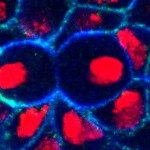Link to Pubmed [PMID] – 10500185
Proc. Natl. Acad. Sci. U.S.A. 1999 Sep;96(20):11382-6
In Drosophila, dominant-negative mutations in the beta2 and beta6 proteasome catalytic subunit genes have been identified as dominant temperature-sensitive (DTS) mutations. At restrictive temperature, beta2 and beta6 DTS mutations confer lethality at the pupal stage. I investigate here the role of proteasome activity in regulating cell fate decisions in the sense organ lineage at the early pupal stage. Temperature-shift experiments in beta2 and beta6 DTS mutant pupae occasionally resulted in external sense organs with two sockets and no shaft. This double-socket phenotype was strongly enhanced in conditions in which Notch signaling was up-regulated. Furthermore, conditional overexpression of the beta6 dominant-negative mutant subunit led to shaft-to-socket and to neuron-to-sheath cell fate transformations, which are both usually associated with increased Notch signaling activity. Finally, expression of the beta6 dominant-negative mutant subunit led to the stabilization of an ectopically expressed nuclear form of Notch in imaginal wing discs. This study demonstrates that mutations affecting two distinct proteasome catalytic subunits affect two alternative cell fate decisions and enhance Notch signaling activity in the sense organ lineage. These findings raise the possibility that the proteasome targets an active form of the Notch receptor for degradation in Drosophila.

